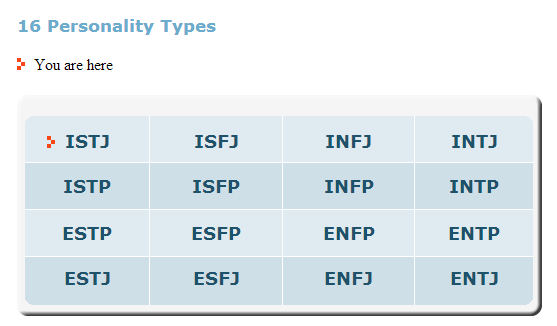Tests Results
- Your Sexual Persona
- Your Personality Type
- Your 5 Factor Personality Report
- The Brain Test
- Emodes Original Inkblot Test
- Comprehensive IQ Report
- Career Interest
- Your Chakra Reading
- Your Emocional IQ Report
- What's Behind Your Emotions?
- Your Enneagram Report
- Your Motivation Report
- Your Picture Personality Report
- Your Plan for Happiness Report
- Your Destity Reading
- The Best Qualites Report
- Your Career Interest Report
- Your Freudian Analisis Report
- Your 7 Secrets of Success Report
- Your Career Personality Type Report
- Your Corporate Culture Report
- Fear Report
- Your Multiple Intelligences Report
- Your Picture Personlity Report
- Your Power Quotient Report
- Your Social Networking Report
- Your Subconscious Mind Analysis
- Your Super IQ Report
- Your True Talent Report
- Your Right Job Report
Who excuse his actions by destiny and indulge yourself, this deserves to make mistakes.
Cum sociis natoque
— Seneca the Younger,
Lucius Annaeus Seneca, called Philosopher,
(4 BC - 65 AD)
Motto
Almost anyone fate did not bestow great and continual success. Only the happiness that comes easily, is persistent and accompanied us to the end. Seneca the Younger (born Lucius Annaeus Seneca, called. Philosopher, 4 BC - 65 AD)
Your Career Personality Type Report
Rafal, your type is:

That means you are more Introverted than Extroverted, Sensing than Intuitive, Thinking than Feeling, and more Judging than Perceiving.
But what do those traits really mean for you — beyond what they mean for the traditional research community? These personality types are standard throughout the entire business world and were derived from the work of renowned psychologist Carl Jung and other experts in the field of psychological "Typing."
Tons of people know their classic type, but not everyone takes the time to really understand it and exploit its strengths. Now you can.
Below is a chart demonstrating all the possible career personality types. Each type is determined by scores on 4 standard scales, Introversion/ Extraversion, Sensing/Intuition, Thinking/Feeling, and Judging/Perceiving.

None of the traits are better or worse than any other. And before you jump to any conclusions, remember that the terms we use to describe each of the scales are just loosely associated with the definitions of those words that you're accustomed to. To find out more, read on.
The most important thing to note about the dimensions, is that just because you are an Intovert doesn't mean you don't also have some Extravert characteristics. The fact that you are an Introvert simply means that you have more Introvert characteristics than Extravert characteristics. The same goes for the other dimensions. Therefore, when you take a look at your career personality type, know that you probably exhibit some tendencies of the other types as well — it's just that more often than not, you a have a tendency to approach the world as an Introvert instead of as an Extravert. Following is more information on each of these dimensions and how you scored on each of them.
(I) Introversion/ (E) Extraversion:
This dimension describes how you approach and interact with the world and direct your energy output. The main misconception people have about this dimension is that introverts are shy and extraverts are loud. Not necessarily true. Introverts like you tend to think first and then speak, they like to reflect on a situation before contributing their thoughts. Extraverts tend to think and talk at the same time. This approach makes them more spontaneous but can also get them into trouble at times. To the Extravert, the outside world represents excitement and opportunity; they think and perform better in front of others. Because their energy is directed outward, Extraverts like being around people most of the time. You, on the other hand, direct your energy inward. You probably enjoy being around people, but prefer more intimate settings where you get to know fewer people on a deeper basis.
(S) Sensing/ (N) Intuition:
This dimension demonstrates how people tend to process information. Sensors tend to focus on concrete information while Intuitives look at the possibilities of a situation. By using your five senses to gather data, you, as a Sensor trust what can be seen, heard, touched, tasted, or felt. You focus on the present and have great attention to detail. You can therefore be relied upon for accurate information. Intuitives, on the other hand, are imaginative and look for deeper and abstract meanings with the information in front of them. When presented with information, Intuitives enjoy pondering implications and consequences for the future. Intuitives look less to details and tend to capture the big picture faster than you.
(T) Thinking/ (F) Feeling:
This dimension demonstrates how you make decisions. Thinkers value analytical thinking and are methodical and logical when evaluating their options. You pride yourself on being objective and not subjective. Feelers, in contrast, tend to see Thinkers as somewhat cold. For Feelers, taking into account how others will be affected is just as important as objective information in the decision-making process. They are more likely to make exceptions to rules than you do. Feelers are highly understanding and therefore may be perceived as too emotional by people such as you who are known as terrific decision-makers.
(J) Judging/ (P) Perceiving:
The last dimension describes whether you prefer closure or openness. Because of your strong need for control, Judgers enjoy structure and order. Judgers are organized and will tasks once they get started on something. Perceivers, on the other hand experience the world spontaneously and don't make daily schedules. Perceivers like keeping their options open and pride themselves on adapting to whatever situation they confront. While Perceives love starting projects, you prefer the sense of accomplishment of completing a project which is why people might look to you as a good "closer."